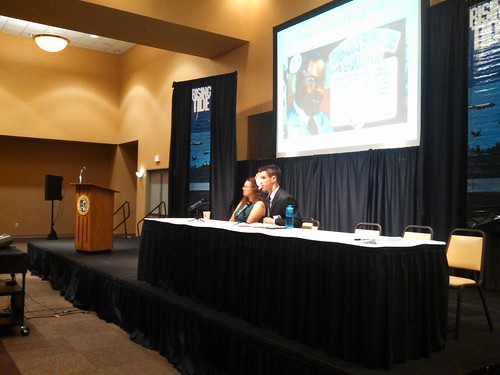
Kevin McQueeney and Jessica Dauterive presenting at Rising Tide 9
A century later, we should be ready to move on.
The popular Palmer Park — surrounded by an array of diverse neighborhoods including Carrollton, Fontainebleau, Pigeontown and Hollygrove — was given its name during an era of nostalgia for the Confederacy to honor a pastor so passionately in favor of slavery that Gen. Robert E. Lee described his oratory as more powerful than “an entire regiment of troops,” according to a presentation by a University of New Orleans researcher.This isn't about "erasing history" it's about reclaiming it. New Orleans is riddled with monuments and streets and place names that the Jim Crow aristocracy applied as deliberate political statements. We can and should refute those statements now. Everyone knows the famous Orwell quote about, "Who controls the past.." This, right here, is what he was talking about.
Benjamin Morgan Palmer was the pastor of the First Presbyterian Church of New Orleans during the Civil War era, and his 1860 Thanksgiving sermon after the election of Abraham Lincoln is credited with spurring Louisiana’s secession. In it, Palmer describes slavery as an institution created by God to benefit the “black races.”
“We know better than others that every attribute of their character fits them for dependence and servitude,” Palmer said. “By nature the most affectionate and loyal of all races beneath the sun, they are also the most helpless; and no calamity can befall them greater than the loss of that protection they enjoy under this patriarchal system.”
The park that bears his name at the corner of South Carrollton and South Claiborne avenues was originally called Hamilton Square when it was created as a formal gathering place for the former city of Carrollton, said Kevin McQueeney, a University of New Orleans graduate student in history who presented his findings Saturday at the Rising Tide conference. Hamilton Square was originally named after Alexander Hamilton, one of the founding fathers, but after Palmer’s death in a streetcar accident in 1902, New Orleans city leaders decided to rename the park after him.
No comments:
Post a Comment